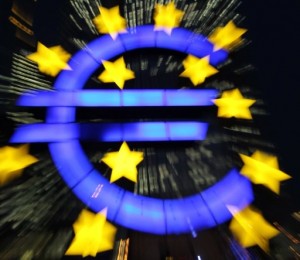Investors told to remain on guard for risks

Picture taken on November 22, 2011, shows the logo of the European currency Euro standing in front of the European Central Bank (ECB) in Frankfurt/M., western Germany. The European debt crisis could take longer than expected, and investors should therefore stay cautious, said an investment expert from Merrill Lynch visiting the Philippines. AFP PHOTO/DANIEL ROLAND GERMANY
After a “challenging” 2011, this year will mark a transition from “uncertainty to more certainty,” but investors should stay cautious early in the year as the resolution of the European debt crisis could take longer than expected, said a visiting investment expert from Merrill Lynch.
Victoria Ip, Merrill Lynch (Asia Pacific) Ltd. managing director and investment strategist, said during a briefing Thursday that the slower global growth and mild recession projected for the European Union could prompt central banks around the world to undertake a second round of monetary easing this 2012.
According to Ip, there is also a 50-percent chance that the US Federal Reserve may initiate a third round of quantitative easing (QE3) over the next six months.
Because the US Fed may not be able to ease its monetary policy further since rates are now near zero levels, it may have to resort to quantitative easing—a scheme of infusing liquidity by buying back bonds.
Expecting an environment marked by low growth, low interest rate and heightened volatility, Ip said equities could generate modest returns this year, while bonds would likely do well.
Article continues after this advertisementSoutheast Asian central banks, including the Bangko Sentral ng Pilipinas, may retain their bias for monetary easing as growth slows and inflation eases.
Article continues after this advertisementBased on the 2012 outlook published by Merrill Lynch in December last year, the BSP is expected to cut key interest rates by 50 basis points as inflation is seen to ease to 3.3 percent this year (from an actual average of 4.8 percent last year), while domestic economic growth is projected to improve to 4.4 percent this year from 3.7 percent in 2011.
Overall, Southeast Asia’s resilience and vulnerability indicators are expected to improve, enabling the region to weather the global downturn.
Ip said it would be better for investors to stay conservative early this year, citing the EU’s critical debt situation.
The European Union may eventually address liquidity and solvency issues, but the reduction in European banks’ assets will still exert significant pressure on global markets, Ip said.
Ip said growth of the global economy would slow to 3.5 percent this year from 4 percent in 2011. Also, the EU may post a 1-percent contraction, while Asia will account for bulk of global expansion, performing twice or three times better than developed markets.
In particular, China is expected to have a “soft landing” with a growth of about 8.6 percent this year.
With inflation pressures in emerging Asia seen to let up, central banks may cut interest rates more aggressively, benefiting Asian assets including equities and bonds, she said.
Asian currencies are also seen to trade weaker against the US dollar in the first half of the year.
Oil will perform steadily this year, averaging at $108 per barrel. Gold will likewise perform well for the 12th straight year, hitting a high of $2,000 an ounce.